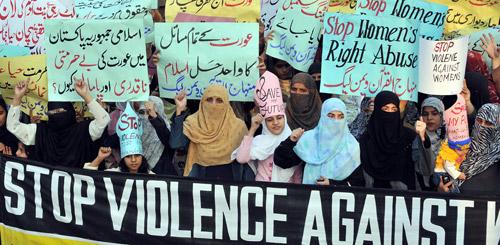
Noor Almaleki was 20 years old and living in Pheonix when she and her friend, 43-year-old Amal Khalaf, were struck by a car driven by Noor’s father. While Amal survived, Noor later died, and her father, Faleh al-Maleki, was later convicted of killing his daughter.
The case of Noor Almaleki has drawn attention, most recently last weekend on CBS’s “48 Hours: Mystery” program, as a suspected case of a so-called “Honor Killing”—one committed here in the United States.
And yet, while the case of Noor Almaleki has made national headlines because it happened in Arizona, so-called “honor killings” happen around the world at an alarming rate, often with little press and no justice for the victim.
Women around the world suffer so-called “honor violence” at the hands of relatives, usually male, in an effort to reclaim family “honor.” If a woman or girl is accused or suspected of engaging in behavior that could taint her family’s status, she may face brutal retaliation from her relatives that often results in violent death.
So-called “honor” crime is rooted in a global culture of discrimination against women, and the deeply rooted belief that women are objects and commodities, not human beings entitled to dignity and rights equal to those of men. Women’s bodies, particularly, are considered the repositories of family honor, and under the control and responsibility of her family (especially her male relatives). And large sections of society share traditional conceptions of family honor and approve of “honor” killings to preserve that honor.
That’s the narrative that is used to justify these brutal attacks on women and girls, but here are the facts:
- The UN estimates that around 5,000 women and girls are murdered each year in so-called “honor killings” by members of their families
- “Honor” killings are widely reported in regions throughout the Middle East and South Asia, but these crimes against women occur in countries as varied as Bangladesh, Brazil, Canada, Ecuador, Egypt, India, Iran, Iraq, Israel, Italy, Jordan, Morocco, Pakistan, Sweden, Syria, Turkey, Uganda, United Kingdom, and the United States.
- Like other forms of violence against women, “honor” violence against women may be considered a form of torture, whether enacted by the state or by an individual.
- While “honor” crime is committed predominantly against women and girls, “honor” crime is also on the rise against LGBT people, particularly gay men
- In many countries, the punishment for “honor” crimes are inadequate or non-existent—laws either do not recognize “honor” crime or have insufficient sentencing for such crime. And in countries where laws have been passed to curb “honor” crime (for example, in Jordan), such laws often go un-enforced.
- According to the Iranian and Kurdish Rights Organization, “Honor Killings are on the rise”, especially in Europe and the US.

Make no mistake: there is no honor in violence against women, and no cultural, social, or religious belief is ever a valid reason to commit violence against women, or deprive anyone of their fundamental human rights.
The murder of women in the name of “honor” is a gender-specific form of discrimination and violence and should be regarded as part of a larger spectrum of violence against women, as well as a serious human rights violation. Violence against women in a global epidemic, and it effects women in every country, at every level of society.
The continued coverage of the case of Noor Almaleki reminds us that women across the world—including our own country—are at risk of such types of gender-specific violence. But so, too, should countless attacks on women’s rights that are part of a culture of discrimination against women.
Any attack on women’s human rights threatens to reduce women to objects or devalue them as less than fully human, and as such, aids and abets in a global culture in which such horrific violence, as happened to Noor and as happens to countless women, is not only possible, but is all too common.
Learn more about violence against women as a human rights issue and take action on behalf of women around the world.
